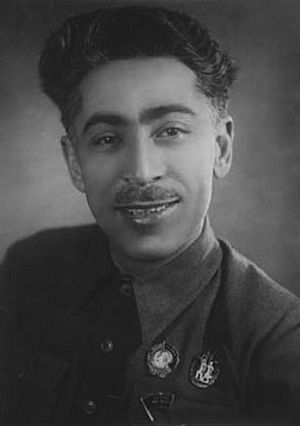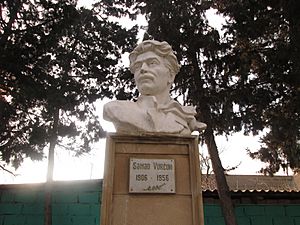Samad Vurgun facts for kids
Quick facts for kids
Samad Vurgun
|
|
|---|---|

Vurgun in 1942
|
|
| Born | March 21, 1906 Yukhary Salahly, Qazakh District, Azerbaijan |
| Died | May 27, 1956 (aged 50) Baku, Azerbaijan |
| Occupation | Poet |
| Signature | |
 |
|
Samad Vurgun (Azerbaijani: Səməd Vurğun; born Samad Yusif oghlu Vekilov; March 21, 1906 – May 27, 1956) was a famous Azerbaijani and Soviet poet and writer. He also wrote plays and was an important public figure.
Samad Vurgun was the first person to be called "People's Artist of the Azerbaijan SSR" in 1943. He was also a member of the Azerbaijan National Academy of Sciences starting in 1945. He won two special awards called the Stalin Prize in 1941 and 1942.
Many places are named after him, like the Azerbaijan State Academic Russian Drama Theatre and streets in Baku and Moscow. He was the first poet in Azerbaijan's history to be given the special title "The Poet of Public."
Contents
Samad Vurgun's Early Life
Samad Vurgun was born on March 21, 1906, in a village called Salahly. This village is in what is now the Qazax District of Azerbaijan.
When Samad was six years old, his mother passed away. His father and his grandmother, Ayshe khanim, took care of him.
After finishing school in his village, his family moved to Qazax. Samad and his older brother, Mekhdikhan Vekilov, went to a teacher's school there.
In 1922, his father died, and a year later, his grandmother also passed away. Their cousin, Khangizi Vekilova, then took care of Samad and his brother.
Samad Vurgun taught literature in village schools. He taught in places like Qazax, Ganja, and Quba.
He studied at Moscow State University for two years, from 1929 to 1930. After that, he continued his studies at the Azerbaijan Pedagogical Institute.
His Role in Society
In 1945, Samad Vurgun became a full member of the Academy of Sciences of Azerbaijan SSR. This is a group of very smart people who do scientific research.
In the same year, a group called the Society of Cultural Relations with Iran was started in Baku. Samad Vurgun became the leader of this group. He helped build a connection between Azerbaijan and Iran through his writings.
In 1953, Samad Vurgun became the Vice President of the Academy of Sciences. He helped discuss important topics in social sciences. He also worked on a plan for scientific publications.
In October 1955, Samad Vurgun became sick while visiting Vietnam. He was part of a group from the Soviet Union. He had to go to the hospital in Beijing, China. Even in the hospital, he wrote short poems.
He returned to Azerbaijan after a few weeks, but his health got worse. Samad Vurgun passed away on May 27, 1956. He was buried in Baku, in a special place called the Alley of Honor.
Samad Vurgun's Writings
Samad Vurgun's very first work was a poem called "Appeal to the youth." It was published in 1925 in a newspaper in Tiflis. He wrote it as a final project for his teacher's school.
His talent for poetry really grew in the 1930s and 1940s. He published a collection of poems called "Konul Defteri" (The Soul's Book) in 1934. Another book of his poems, "Sheirler" (Poems), also came out that year.
He wrote many new and important works during this time. In 1935, he made great progress in his writing. He wrote seven long poems and about 100 shorter poems.
His poem "Azerbaijan" is considered one of the best works in Azerbaijani literature. It talks about Azerbaijan's old history, its beautiful nature, and the kindness of its people.
Samad Vurgun's first book, "Şairin andı" (Poet's Oath), was published in 1930. The Great Patriotic War (World War II) was a very important time for him. He wrote more than 60 poems during the war. One of these was "Bakının dastanı" (Legend of Baku).
His fame grew a lot during the war. His poem "To partisans of Ukraine" was even printed on leaflets. These leaflets were dropped from planes into forests in Ukraine to encourage soldiers fighting there.
In 1943, Samad Vurgun's poem "Ananın öyüdü" (Farewell speech of mother) won a top award. It was in a contest for the best anti-war poem in the US. In New York, this poem was chosen as one of the 20 best war-themed poems in the world. It was given to soldiers to read.
In the same year, a place called "House of Intellectuals named after Fuzuli" opened in Baku. Samad Vurgun helped start it. It was a place for events and meetings with soldiers.
Collected Poems
- The Poet's Oath (1930)
- The Lamp (1932)
- The Parched Books (1947)
Long Poems
- The Komsomol Poem (1933, not finished)
- Even (1932)
- Muradkhan (1933)
- Khumar (1933)
- Lokbatan (1933)
- Village morning (1933)
- Death place (1934)
- Bitter memories (1935)
- 26 (1935)
- Gallows (1935)
- Dead love (1935)
- Rebellion (1936)
- Basti (1936)
- A Negro tells (1948)
- Mugan (1949)
- Reading Lenin (1950)
- Aygun (1951)
- The Standard Bearer of Century (1954)
Plays and Dramas
- Vagif (1937) - This play tells the sad story of a poet named Molla Panah Vagif.
- The sun is rising (1938–1939)
- Two Lovers (1940)
- Farhad and Shirin (1941) - This is a poetic play based on an old story by Nizami.
- The Man (1945)
- Khanlar (1939) - This play is about the life of a revolutionary named Khanlar Safaraliyev.
Translations by Samad Vurgun
Samad Vurgun also translated many famous works into Azerbaijani.
- In 1936, he translated A.S. Pushkin's poem "Eugene Onegin". For this, he received a special medal.
- In 1936, he translated parts of Shota Rustaveli's poem "The Knight in the Panther's Skin". He received an honorary award for this.
- In 1939, he translated Nizami's poem "Layla and Majnun".
- He also translated poems by other well-known writers like Taras Shevchenko, Maxim Gorky, Ilia Chavchavadze, and Zhambyl.
Awards and Honors
Samad Vurgun received many awards for his work:
- People's Poet of the Azerbaijan SSR (1956)
- Stalin Prize (second degree) in 1941 for his play "Vagif"
- Stalin Prize (second degree) in 1942 for his play "Farhad and Shirin"
- Two Lenin Orders, which are very high honors.
Samad Vurgun's Family
Samad Vurgun was married to Khaver khanim Mirzabeyova. They had three children:
- His son, Yusif Samadoglu, became a People's Writer of Azerbaijan.
- His son, Vagif Samadoglu, became a National poet of Azerbaijan in 2000. He also received a special award called the Istiglal (Independence) Order.
- His daughter, Aybeniz Vekilova, is an Honored Culture Worker.
Poems Written for Samad Vurgun
Other poets wrote poems dedicated to Samad Vurgun:
- "Speech of my friend Samad Vurgun at lunch in London" by Konstantin Simonov
- "To Samet Vurgun" by Nâzım Hikmet
Remembering Samad Vurgun
People remember Samad Vurgun in many ways:
- In 1976, the USSR released a postage stamp honoring him.
- In 2006, Azerbaijan also released a postage stamp dedicated to him.
- In Azerbaijan, 70 streets, 7 libraries, 20 schools, 5 culture centers, 5 parks, and 4 cinemas are named after Samad Vurgun.
- A street in Moscow (Russia) and Derbent (Dagestan) are named after him.
- A library in Kyiv (Ukraine) and a school in Dushanbe (Tajikistan) also carry his name.
- A technical school in Plovdiv (Bulgaria) is named after him.
- The Azerbaijan State Academic Russian Drama Theatre and a town in Qazax are also named in his honor.
See also
 In Spanish: Samad Vurgun para niños
In Spanish: Samad Vurgun para niños
 | Georgia Louise Harris Brown |
 | Julian Abele |
 | Norma Merrick Sklarek |
 | William Sidney Pittman |


